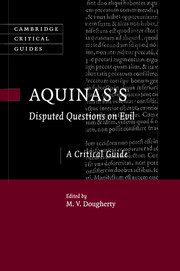Book contents
- Aquinas’s Disputed Questions on Evil
- CAMBRIDGE CRITICAL GUIDES
- Aquinas’s Disputed Questions on Evil
- Copyright page
- Contents
- Contributors
- Book part
- Glossary
- Introduction
- Chapter 1 Metaphysical themes in De malo, 1
- Chapter 2 Weakness and willful wrongdoing in Aquinas’s De malo
- Chapter 3 Free choice
- Chapter 4 Venial sin and the ultimate end
- Chapter 5 The promise and pitfalls of glory: Aquinas on the forgotten vice of vainglory
- Chapter 6 The goodness and evil of objects and ends
- Chapter 7 Evil and moral failure in De malo
- Chapter 8 Attention, intentionality, and mind-reading in Aquinas’s De malo, q. 16, a. 8
- Chapter 9 Evil as privation: the Neoplatonic background to Aquinas’s De malo, 1
- Chapter 10 Moral luck and the capital vices in De malo: gluttony and lust
- Bibliography
- Index
- References
Bibliography
Published online by Cambridge University Press: 05 December 2015
- Aquinas’s Disputed Questions on Evil
- CAMBRIDGE CRITICAL GUIDES
- Aquinas’s Disputed Questions on Evil
- Copyright page
- Contents
- Contributors
- Book part
- Glossary
- Introduction
- Chapter 1 Metaphysical themes in De malo, 1
- Chapter 2 Weakness and willful wrongdoing in Aquinas’s De malo
- Chapter 3 Free choice
- Chapter 4 Venial sin and the ultimate end
- Chapter 5 The promise and pitfalls of glory: Aquinas on the forgotten vice of vainglory
- Chapter 6 The goodness and evil of objects and ends
- Chapter 7 Evil and moral failure in De malo
- Chapter 8 Attention, intentionality, and mind-reading in Aquinas’s De malo, q. 16, a. 8
- Chapter 9 Evil as privation: the Neoplatonic background to Aquinas’s De malo, 1
- Chapter 10 Moral luck and the capital vices in De malo: gluttony and lust
- Bibliography
- Index
- References
- Type
- Chapter
- Information
- Aquinas's Disputed Questions on EvilA Critical Guide, pp. 235 - 244Publisher: Cambridge University PressPrint publication year: 2015



